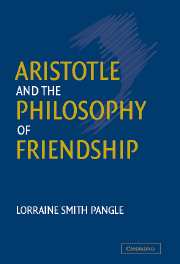Book contents
- Frontmatter
- Contents
- Acknowledgments
- Introduction
- 1 The Challenge of Plato's Lysis
- 2 The Three Kinds of Friendship
- 3 Aristotle and Montaigne on Friendship as the Greatest Good
- 4 Friendships in Politics and the Family
- 5 Cicero's Laelius: Political Friendship at Its Best
- 6 Quarrels, Conflicting Claims, and Dissolutions
- 7 Friends as Other Selves
- 8 Goodwill, Concord, and the Love of Benefactors
- 9 Self-Love and Noble Sacrifice
- 10 Friendship in the Happy Life
- Notes
- Bibliography of Modern Works and Editions
- Index of Names
8 - Goodwill, Concord, and the Love of Benefactors
Published online by Cambridge University Press: 04 July 2009
- Frontmatter
- Contents
- Acknowledgments
- Introduction
- 1 The Challenge of Plato's Lysis
- 2 The Three Kinds of Friendship
- 3 Aristotle and Montaigne on Friendship as the Greatest Good
- 4 Friendships in Politics and the Family
- 5 Cicero's Laelius: Political Friendship at Its Best
- 6 Quarrels, Conflicting Claims, and Dissolutions
- 7 Friends as Other Selves
- 8 Goodwill, Concord, and the Love of Benefactors
- 9 Self-Love and Noble Sacrifice
- 10 Friendship in the Happy Life
- Notes
- Bibliography of Modern Works and Editions
- Index of Names
Summary
In the remaining chapters of Book 9, Aristotle will spell out in detail the implications of his concept of friendship as extended self-love that he introduces in 9.4. In 9.5, he will analyze the elements of friendship that consist in wishing for the friend's life and well-being, or goodwill, and discuss how this crucial root of friendship comes into being. In 9.6, he will turn to friends' agreement in practical choices, or concord, and the resulting common activity and sense of solidarity that promote goodwill and that form the core of political friendship. In 9.7, he will explore the roots of benevolent activity and the ways in which it strengthens goodwill and affection. After taking up again the question of self-love in 9.8, Aristotle then in 9.9, 9.10, and 9.12 discusses the desirability and best conditions for friends' spending their days together, and in 9.11, he gives his final reflections on the possibilities of friends' sharing their sorrows and joys.
Goodwill
Aristotle makes a fresh beginning in 9.5 with the theme of goodwill, the utterly indispensable basis of friendship, the necessary beginning that is barely a beginning, the critical impulse of selflessness that remains, when left to itself, passive, idle, and weak, but without which none of the beauty and none of the joy of friendship could ever exist.
- Type
- Chapter
- Information
- Aristotle and the Philosophy of Friendship , pp. 155 - 168Publisher: Cambridge University PressPrint publication year: 2002

